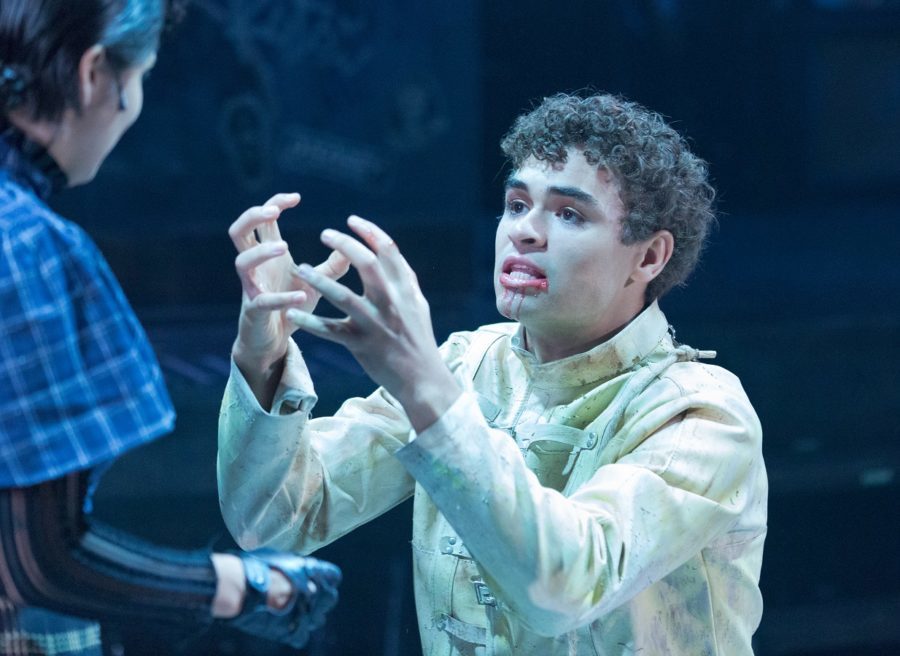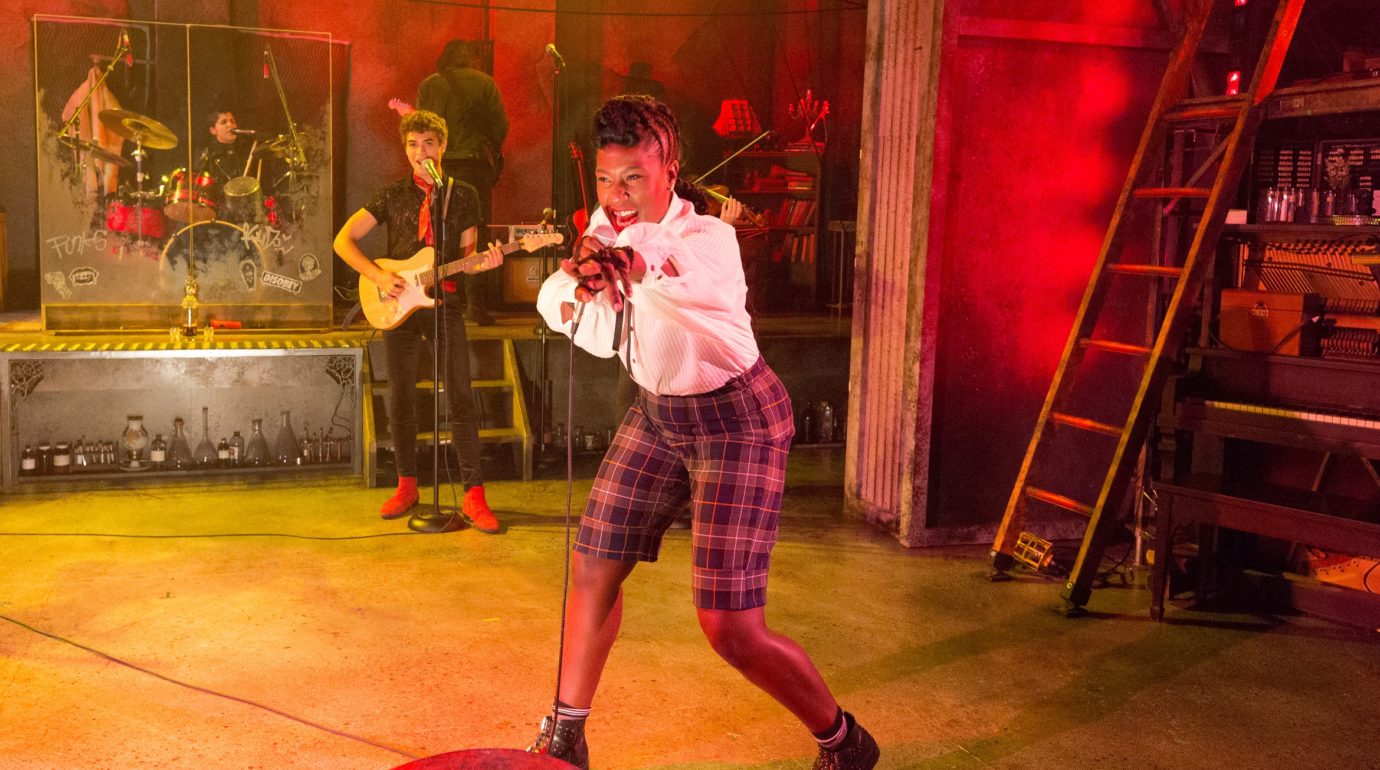Can a Black girl be called “pale”? How about a Latina ? No matter how you parse the linguistic technicality, the word smacks of whiteness, said one of the actors. And so on Day Two of rehearsal at People’s Light in Malvern, Pa., for Such Things as Vampires, I entered into my first challenging conversation as the Equity, Diversity & Inclusion (EDI) Advocate on the production. Sitting in a circle on the floor, two female actors of color asked the creative team to change the phrasing. The creators not only listened but brought back a new song that week. Whew, crisis averted! And there were more to come.
That’s why I was there.
Such Things as Vampires, co-created by Zak Berkman, Stuart Carden, Jessie Fisher, and Mary Tuomanen, is a lesbian love story adaptation of Dracula. It included the first gay kiss on People’s Light’s stage, scenes of sexual violence, and numerous vampiric exchanges of blood, enacted by a cast of six actors who also doubled as musicians. Given the potentially triggering content and the layers of identity presented in the cast—which contained actors of different races and on the LGBTQ spectrum—it felt particularly important to tread carefully into the rehearsal process.
As the EDI Avocate, my presence was intended to foster a rehearsal environment so that everyone in the room—actors, co-creators, stage management, designers, institutional and production staff—could feel safe in sharing concerns and thoughts, to feel ownership over the generative process, and to be present with their whole identities.
Says Carden, who also directed Vampires, “With so many intersections of identity in this piece—race, power dynamics, gender representation, and sexuality—I was excited about having an EDI Advocate in the room because I wanted as many perspectives as we could have.”
People’s Light has been on an EDI journey for the past two years, working with TCG’s Equity, Diversity & Inclusion Cohort and ArtEquity. Following their 2017-18 season, according to Berkman, producing director of People’s Light, “We recognized there were many times we were not fully prepared to engage in and be responsive to the needs of our artists and the conversations that our work was spurring among them, our staff, and our audiences.”
Adds Berkman, “Having an EDI Advocate served as a constant reminder and embodiment of our core beliefs in the room.” With the help of trusted mentors Rebecca Noon and Jacqueline Thompson, and my co-EDI Advocate Terrell Green, I created a plan to put these ideals into practice.

At the top of the first day of rehearsal, I spent an hour setting the tone through ensemble-building exercises and the creation of shared community values. I defined EDI, explained the impetus behind the creation of my position, and laid out some ground rules, encouraging everyone to acknowledge we would all make mistakes as we head into this new mode of play development. We went around the circle and introduced ourselves, expressing all the parts of our identity we felt comfortable sharing (including but not limited to name, pronouns, race/ethnicity, gender, sexual orientation, and vocation). One person, moved by the spirit of inclusivity in the room, came out as non-binary for the first time ever in a professional context.
We then broke into small groups for ensemble-building exercises to find common ground. Finally we came back together to brainstorm shared community values, including respect, self-care, asking for what you need, and assuming best intentions, which were recorded and later posted in the room for future reference.
We also created opening and closing rituals for each rehearsal day, which gave everyone room to ramp up and cool down from the strenuous process. We developed a vocabulary of safe words, which anyone could use to flag subjects for discussion as they came up in rehearsal. “Shroom” signaled something that felt sticky and needed addressing, but didn’t necessarily require rehearsal to halt. “Mushroom” meant the person who said it did not feel comfortable proceeding without addressing the issue in that moment. This very deliberate world-building helped create a cocoon in which the play was able to mature.
Following this tone-setting work, my major role in the development process was presence: active listening, attentive observation, and a constant readiness to jump in when a conversational ally was needed. As I was a free agent in the room, I could offer support to every person equally.
I helped the co-creators initiate a conversation with the cast about creative ownership of material developed in the rehearsal process. I helped cast members discuss parts of the script they found offensive with the writers. I sat in on affinity groups and production meetings, participating as an active listener or mediator, as necessary. I weighed in on the content warning. I was available as a one-on-one resource for anyone who was having a hard time managing their emotional responses to the material, such as a scene of near-sexual assault and the “triple transfusion” scene, in which three male characters forcibly give an unconscious woman a blood transfusion.
As in every intensive rehearsal process, there were tears. There were crises. There were hurt feelings and there were mistakes. But given our shared commitment to honesty and transparency, for the most part the challenging conversations took place in the rehearsal room, rather than behind closed doors (or at a bar afterwards).
We had forthright discussions about the violence in the piece (working closely with Eli Lynn, our fight/intimacy director) so that actors could trust each other enough to declare boundaries and take greater risks. Performer Daniel Croix Henderson says, “I felt more comfortable being myself throughout the entire process. At People’s Light, conversations about content involving marginalized people were on the table, and there was space for exploration and discussion around how to most responsibly tell our story. Having an EDI Advocate was a constant acknowledgement of systems of power in the room and helped us navigate those systems with clarity and mutual respect.”
After three and a half weeks in the rehearsal room, we moved into tech, and I led a similar (condensed) introduction in the theatre space, crowding every designer, technician, and production staff member onstage in a circle with the stage management, cast, and creative team for a group welcome. One significant lesson from the experience, says Carden, was that would he ideally prefer to begin work with an EDI Advocate when the project is first selected by the theatre, allowing for relationship-building through the process of casting, designer selection, and design process.
And as much as we were able to create a common framework and empower everyone to self-advocate, baked-in power dynamics still existed along lines of hierarchy, race, gender, age, and experience, which influenced our conversations.
There’s also no denying this way of working takes more time. “Yes, I could have accomplished some more traditional things a director does if we didn’t incorporate our EDI work as fully and deeply as we did in our process,” Carden admits, adding, “But it would have diminished the richness of the work we were doing.” And once the groundwork was laid for navigating differences, we were able to negotiate them more more efficiently later.
Performer Crystal Lucas-Perry says the EDI tone-setting allowed her to feel taken care of, which meant she could “let go of having to protect yourself in the room.” Castmate Pearl Rhein agrees, saying, “So often in a rehearsal room you realize you are the only one who can advocate for your physical safety. It’s really tough to do your job when that has to become your top priority.”
Everyone involved in Such Things as Vampires talked about carrying this work, this expectation, this level of awareness and presence and mindfulness with them into their next rehearsal rooms. Carden says he learned how to use his power as a director to more intentionally lift other voices in the room. Croix Henderson says he plans on taking his feelings of empowerment into his next rehearsal room. “As an actor and creative collaborator, I’m not going to turn a blind eye toward storytelling that is exploitative of people of color. This process has helped me figure out what I’m able to bring to the room in the future.”
Meanwhile People’s Light is examining how to work an EDI Advocate into more productions going forward, starting with allocating funding. In imagining other iterations of this position, the possibility of combining it with another existing role—such as dramaturg, director, stage manager, or intimacy director—arose several times. While this double duty is certainly possible, I believe it would curtail the freedom and flexibility of an EDI Advocate in certain situations.
That’s why, according to Berkman, “in a perfect world, we would have one for every show we do.”
Amelia Parenteau is a writer, translator, and theatremaker based in New Orleans, and a frequent contributor to this magazine. Read more at www.amelia-parenteau.com.


